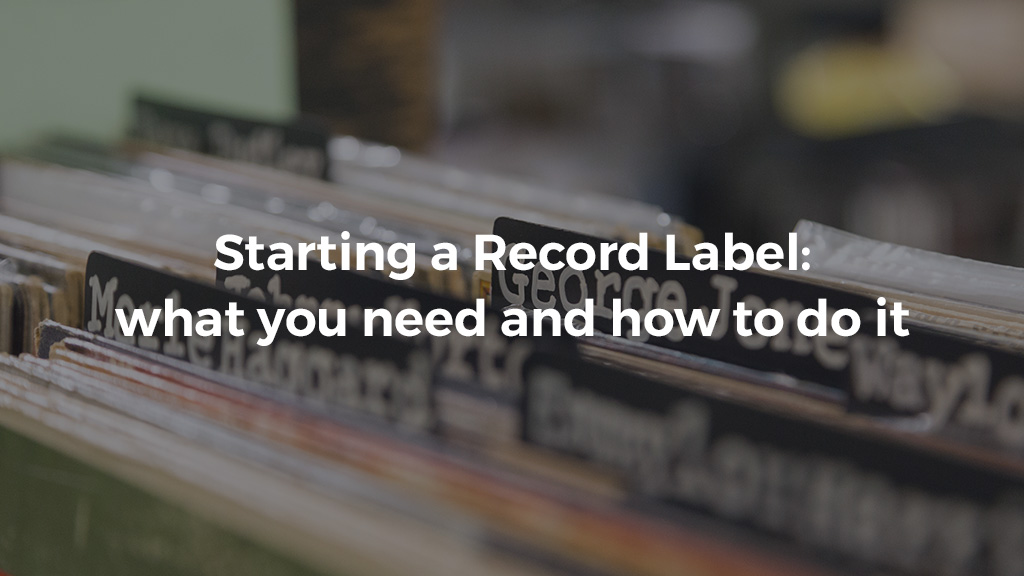Blog
Starting a Record Label: what you need and how to do it
24 Jan '2020
Now that the dust has settled on the internet revolution, discover what a record label actually does, and get prepared for creating one of your own.

We don’t need to tell you that the music industry has radically changed in the past ten or twenty years – as has the job of a musician and/or producer. And yet, people still listen to music, so there’s music to be made, and money out there for making it.
Whatever your financial situation, it’s possible to create a record label – and while money is certainly going to open doors for anyone hoping to make an impact, it’s not essential. As long as you’ve got time on your hands, it’s very possible to start a record label with no money, too.
See also: The 9 Roles of a Record Label in the 2020s
What does a Modern Record Label Do?
Back in the day, getting your music ‘out there’ was a lot more literal – it was about manufacturing, shipping and distribution, making sure that records and CDs were available to buy in shops around the world. Thanks to this vital stage of the process, record labels held a lot of sway over music; but nowadays, thanks to the internet, it’s possible to get music onto virtual stores with a lot less effort. So what’s left for a record label?

The first function of a label is to act as a curator for great music. By building up a roster of artists who are shining examples in their field, your listeners will flit from one to the other, realising that your label is the place to find music that they love as much as you do. Not only is it a ringing endorsement for an artist to release something through your label, they’ll get more listeners for it too. We’ll talk more about cultivating this later.
Another key function of record labels today is far more administrative – it’s about looking after royalty payments, arranging live shows, designing artwork, uploading and releasing music, making sure it’s available online, getting tunes mastered, even social media, and so much more. Your super-talented musicians are great at making awesome tunes, so let them do what they do best, rather than bogging them down in the admin of being a musician.
This is the crucial way you should be thinking of your label: as something that takes all the crap out of a musician’s hands and lets them make better music.
Do you Need Money to Start a Record Label?
The simple answer is No… but as with all things, having some money behind you will help. In the digital world, it’s very easy to get stuff out there, and money tends to be a secondary consideration to time. When you get busy enough and start paying others to help out with your projects, what you’re really paying for is their time.
When you think of the necessary things needed for the basic functions of a record label, especially at the start, it all comes down to time. You spend time finding artists, talking to people, engaging on social media, designing a logo, uploading tunes to distribution services – most of these can be done without money, as long as you’re willing to spend your time and effort learning how it’s done.
When you think of the necessary things needed for the basic functions of a record label, especially at the start, it all comes down to time
In the final analysis, while doing these things yourself is possible, it’s ideal to pay dedicated services and talented people who know what they’re doing. Just like how it’s better to leave your musicians to make music, a graphic designer will likely do a better job at logo design than a label manager, and a digital distribution service like Tunecore will probably do a better job at uploading music to more places as well.
Building your Curator Brand
If you’re building a serious record label, you’ve got to be in this for the long run. Choosing the right artists might seem like a question of who’s popular at the moment or which friend you owe the most favours to, but you’re a lot less likely to find success by picking people this way.

At its heart, your label needs a reputation to be successful – it needs to be a hub for people to find great new artists, who you lend reputation when you invite them to join your ranks. The aim is for your record label to be seen as a tastemaker.
Consider which artists you’d like to work with, but also whether they relate to a bigger roster of musicians. If you’ve got three techno artists in your ranks, suddenly introducing a smooth jazz pianist probably won’t get the attention of your existing fans. That’s obvious, but the principle still applies to artists who are closer in genre – but still no cigar. When the biggest labels sign a new talent, existing fans can be sure that they’ll be interested, and everybody’s happy.
Great curation starts from the start, so you need to be ready to make the tough decisions on who fits your ‘brand’ from day one.
See also: The 9 Roles of a Record Label in the 2020s
Making it Official
So, are you ready to create a record label? There are some more things you’ll need to do to make sure you’re flying in the right direction. Your label should be both a business and a brand like any of your artists, so there are some things to think about to make things official.
Making a business plan for a record label is a good step to take at the outset. While this in itself won’t mean the difference between success and failure, it will help crystallize your thoughts and plans, and might expose any weaknesses you can put effort into later.
Making a business plan will help crystallize your thoughts and plans, and might expose any weaknesses you can put effort into later.
Creating a Logo
Just like an artist will benefit from graphic design, your label will need its own artwork – at least in the form of a logo. The mission here is to create something simple; something that will make an impression, be easily memorable, be associated with you, get your labels’ personality across, and last for a long time.
It’s no easy task to come up with something that ticks every one of those boxes, but remember that great design – like great music production – is about taking things away rather than adding things. If you have the help of a great graphic designer, this can be a key way to get your point across.
Building a Website
With websites too, it’s entirely possible to build something for no money, with website builders like Wordpress and Weebly offering free hosting and design, as long as you can live with some limitations. The purposes of these free services is to upsell you to paid versions when you outgrow the free service. For this reason, choose your free web host based on what the full version will be able to do, and what it will cost. It’s hard to migrate an entire website when you’ve been using it for years!
Choose your free web host based on what the full version will be able to do, and what it will cost
If you’ve got a bit of money behind you, you can pay for the more premium versions of these website hosts – services like SquareSpace and Wix are other options here – but again, ensure that these companies’ monthly fees are something you’re able to pay in the long-term, as the business models used by these companies rely on you not wanting to migrate an entire website to another platform.
Registering your Company
You’re a real company with money-making potential, not just one person saying they’re a record label, and so it’s time to make things official. As the director of a company, you’ll have to register with your country’s government. While it might sound like a complicated, heady experience, it’s entirely possible to do this online in a short amount of time in most countries.
Of course, you’ll also have to keep to certain other legal responsibilities in order to meet the needs of your company. Keeping the registration information up to date is just the start – you’ll need to do the whole shebang…
Accountancy and Tax
Keeping track of where the money is, filing tax returns and keeping the company legal are all considerations you’ll have to make as you move things forward with your record label. It’s possible to take care of taxes yourself, but get it wrong and you’re in trouble. Hiring an account will ensure that everything is done correctly – as long as you keep records for them and pay their fees.
Make sure you look up your obligations in your country of operation and in other territories.
Contracts and Legal
When dealing with artists, percentages and responsibilities, it’s almost vital to have an agreement in writing. This doesn’t mean you have to fork out loads of money on a lawyer who will draft a perfect contract for your label based on your own situation – although that is indeed the best option for those with money.

For those without money, it’s possible to find template contracts online that you can use, making sure you’ve got one that deals with your own situation as closely as possible. These contracts can’t be an exact match to protect both you and the artist in all circumstances, but they can get closer than your own in most cases.
At the most basic level, it’s possible to write your own contract. This will technically be legally binding in most countries, but if any disputes arise, you’ll know that you’re on weaker ground to fight your corner, having not had every eventuality agreed to by a trained professional. Make sure to store and save emails regarding the agreement, so that you can access additional written communication if anything ever goes wrong.

